
Juche, officially the Juche idea, is the state ideology of North Korea and the official ideology of the Workers' Party of Korea. North Korean sources attribute its conceptualization to Kim Il Sung, the country's founder and first leader. Juche was originally regarded as a variant of Marxism–Leninism until Kim Jong Il, Kim Il Sung's son and successor, declared it a distinct ideology in the 1970s. Kim Jong Il further developed Juche in the 1980s and 1990s by making ideological breaks from Marxism–Leninism and increasing the importance of his father's ideas.

The Down-with-Imperialism Union was allegedly founded on 17 October 1926 in Hwatian County, Kirin, China, in order to fight against Japanese imperialism and to promote Marxism–Leninism. It is considered by the Workers' Party of Korea to be its root and foundation and its creation is celebrated every year.

Hwang Jang-yop was a North Korean politician who served as the Chairman of the Supreme People's Assembly from 1972 to 1983 and was largely responsible for crafting Juche, the state ideology of North Korea. He defected to South Korea in 1997, the highest-ranking North Korean to have defected.
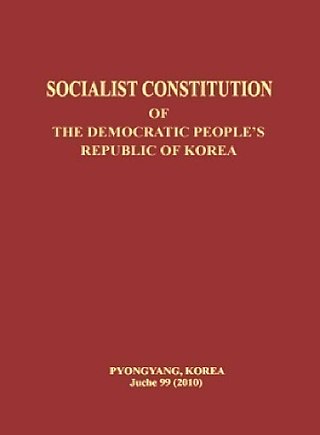
The Socialist Constitution of the Democratic People's Republic of Korea is the constitution of North Korea. It was approved by the 6th Supreme People's Assembly at its first session on 27 December 1972, and has been amended and supplemented in 1998, 2009, 2012, 2013, 2016, 2019 (twice), and in 2023. It replaced the country's first constitution which was approved in 1948.

Songun is the "military-first" policy of North Korea, prioritizing the Korean People's Army in the affairs of state and allocation of resources. "Military-first" as a principle guides political and economic life in North Korea, with "military-first politics" dominating the political system; "a line of military-first economic construction" acting as an economic system; and "military-first ideology" serving as the guiding ideology.

The Workers' Party of Korea (WPK) is the sole ruling party of the Democratic People's Republic of Korea, commonly known as North Korea. Founded in 1949 from the merger of the Workers' Party of North Korea and the Workers' Party of South Korea, the WPK is the oldest active party in Korea. It also controls the Korean People's Army, North Korea's armed forces. The WPK is the largest party represented in the Supreme People's Assembly and coexists with two other legal parties making up the Democratic Front for the Reunification of Korea. However, these minor parties are completely subservient to the WPK and must accept the WPK's "leading role" as a condition of their existence. The WPK is banned in the Republic of Korea under the National Security Act and is sanctioned by the United Nations, the European Union, Australia, and the United States.

The Grand People's Study House is the central library located in the North Korean capital, Pyongyang. The building is situated on Kim Il Sung Square by the banks of the Taedong River.

Kim Jong Il was the Supreme Leader of North Korea from 1994 to 2011.
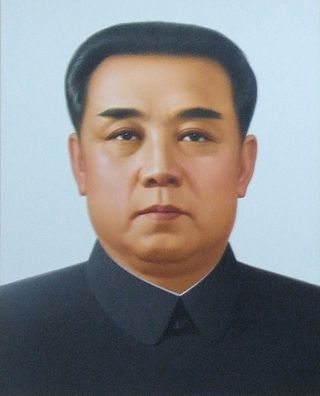
Kim Il Sung was the leader of North Korea for 46 years, from its establishment in 1948 until his death in 1994.

The 6th Congress of the Workers' Party of Korea (WPK) was held in the February 8 House of Culture in Pyongyang, North Korea, from 10 to 14 October 1980. The congress is the highest organ of the party, and is stipulated to be held every four years. 3,062 delegates represented the party's membership; 117 foreign delegates attended the congress, without the right to speak. The congress saw the reappointment of Kim Il Sung as WPK General Secretary and the Presidium of the Politburo established as the highest organ of the party between congresses.

Reminiscences: With the Century is the autobiography of Kim Il Sung, founder and former president of North Korea. The memoirs, written in 1992 and published in eight volumes, retell Kim's life story through his childhood to the time of Korean resistance. Initially, a total of 30 volumes were planned but Kim Il Sung died in 1994 after just six volumes; the seventh and eight volumes were published posthumously. The work reveals early influences of religious and literary ideas on Kim's thinking. An important part of North Korean literature, With the Century is held as a valuable if unreliable insight into the nation's modern history under late colonial Korea. The book is considered one of a few North Korean primary sources widely available in the West and as notable research material for North Korean studies.

On the Art of the Cinema is a 1973 treatise by the North Korean leader Kim Jong Il. It is considered the most authoritative work on North Korean filmmaking.

On the Juche Idea is a treatise attributed to North Korean leader Kim Jong Il on the North Korean Juche ideology. It is considered the most authoritative work on Juche.
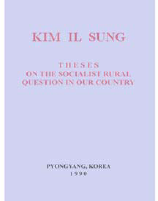
Theses on the Socialist Rural Question in Our Country, also known as the Rural Theses or Theses on the Socialist Agrarian Question in Our Country, is a 1964 treatise by Kim Il Sung, the first leader of North Korea. The work lays out the most influential statement on North Korean agricultural policy and its implementation transformed the country's agriculture from a traditional into a modern one. Crop yields were increased, but some environmental problems like deforestation ensued.
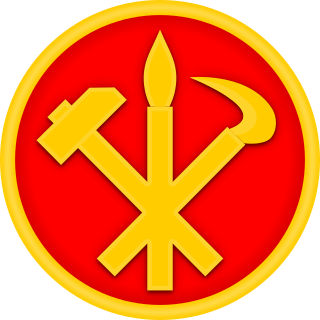
The Propaganda and Agitation Department, officially translated as the Publicity and Information Department, is a department of the Central Committee of the Workers' Party of Korea (WPK) tasked with coordinating the creation and dissemination of propaganda in North Korea. It is the highest propaganda organization in the country.
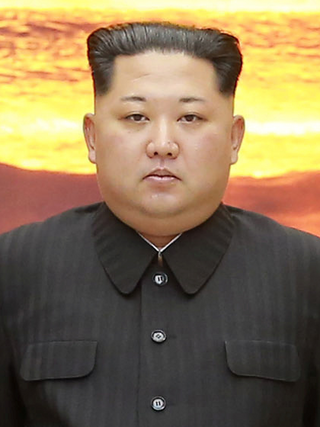
Kim Jong Un has been the supreme leader of North Korea since the death of Kim Jong Il in 2011.

Let Us March Forward Dynamically Towards Final Victory, Holding Higher the Banner of Songun is a speech by Kim Jong Un on 15 April 2012, given to commemorate the centenary of the birth of Kim Il Sung. It was his first major public speech after succeeding his father Kim Jong Il after his death in 2011. He had given at least one speech, Let Us Brilliantly Accomplish the Revolutionary Cause of Juche, Holding Kim Jong Il in High Esteem as the Eternal General Secretary of Our Party, to party officials the week before.
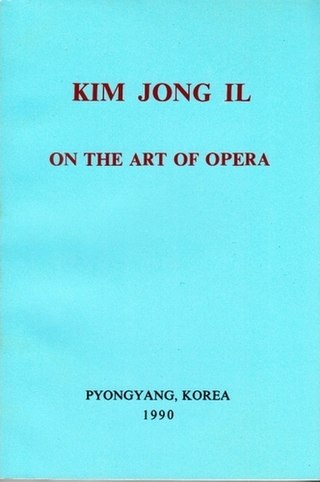
On the Art of Opera is a 1974 treatise by Kim Jong Il on opera. According to Korea University associate professor of North Korean studies Jae-Cheon Lim, it is one of the most important North Korean works on the arts. At the time of writing, Kim had just started his career in the North Korean cultural industry. The piece takes as its framework the Juche ideology and "seed" theory that Kim had previously applied to cinema. Because opera is a mixed art form, Kim finds it particularly revealing of a nation's artistic state and important for the application of his seed theory. Kim finds hierarchies between and within elements of opera, like instruments subordinate to vocals and music over dance. The main thrust of the work is to replace classical – mainly Western but also certain forms of Korean – opera with an allegedly superior Korean revolutionary opera. Kim analyzes various Western operatic forms such as aria, recitative, and leitmotif to reject them. In Kim's view, the ideal revolutionary opera should be based on stanzaic and strophic songs, of which the highest form is a supposedly novel form of offstage chorus called pangchang. The opera that is, according to Kim, most characteristic of his ideas is Sea of Blood, which is to be emulated.
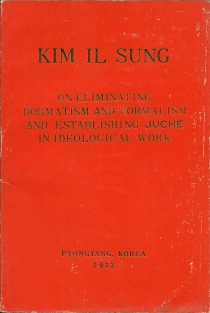
On Eliminating Dogmatism and Formalism and Establishing Juche in Ideological Work, also known as the "Juche speech", was a speech delivered on 28 December 1955 by Kim Il Sung. The address mentioned his Juche ideology by name for the first time. It is considered one of Kim's most important works and a "watershed moment" in North Korean history. Views differ if the speech used the term juche to launch an ideology or more conservatively to assert that the Korean people were the subject of the revolution. The former believes that Juche, as a distinct ideology, was developed by Hwang Jang-yop on his re-discovery of the speech. The speech was published for the first time in 1960 and in many subsequent, heavily edited revisions since.

Officially, the Workers' Party of Korea (WPK) – the ruling party of North Korea – is a communist party guided by Kimilsungism–Kimjongilism, a synthesis of the ideas of Kim Il Sung and Kim Jong Il. The party is committed to Juche, an ideology attributed to Kim Il Sung which promotes national independence and development through the efforts of the popular masses. Although Juche was originally presented as the Korean interpretation of Marxism–Leninism, the party now presents it as a freestanding philosophy. The WPK recognizes the ruling Kim family as the ultimate source of its political thought. The fourth party conference, held in 2012, amended the party rules to state that Kimilsungism–Kimjongilism was "the only guiding idea of the party". Under Kim Jong Il, who governed as chairman of the National Defence Commission, communism was steadily removed from party and state documents in favour of Songun, or military-first politics. The military, rather than the working class, was established as the base of political power. However, his successor Kim Jong Un reversed this position in 2021, replacing Songun with "people-first politics" as the party's political method and reasserting the party's commitment to communism.





















